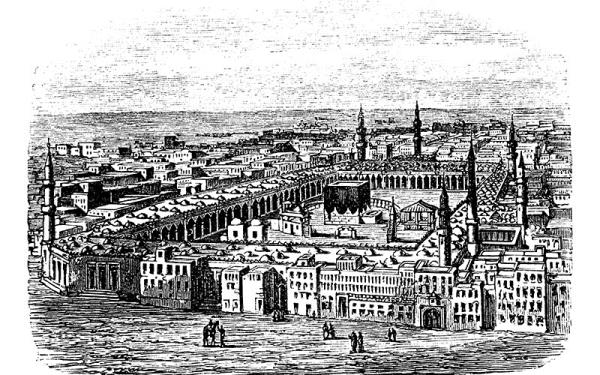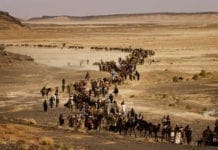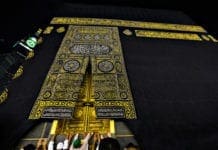Prophet Muhammad (saw) was born to the tribe of Quraysh in the Arabian city of Makkah. This city had been built up around the Ka’bah, the structure built by Prophets Abraham (as) and Ishmael (as) in response to a divine command. The two prophets, to whom Muhammad’s ancestry is traced, had dedicated the House for the worship of Allah, the one true God. But with the passing of centuries, the tribes of Arabia, while still acknowledging Allah as the Creator, had turned to polytheism and idol worship. Some claimed that these idols were intermediaries between the people and Allah, while others worshipped Allah as merely one of their many deities. They had filled and surrounded the Ka’bah with statues, stones and other objects of worship.
The House of Allah was what made Makkah a center of commerce as well as one of worship and gave its people honor among the neighboring tribes. During the pilgrimage season in particular, the Quraysh hosted guests and delegations from near and far. As custodians of the Ka’bah, they were guardians of the idols as well. Their prestige and authority throughout the Arabian Peninsula and beyond was derived from this role, and their business interests necessitated the maintenance of this tradition.

A year before the birth of the Prophet (saw), a Christian army commanded by Abrahah al-Ashram, a ruler of Yemen, marched to the outskirts of Makkah with the intention of destroying the Ka’bah. He had hoped to replace the Ka’bah, the center of worship and pilgrimage for the Arabs, with a large cathedral he had built in Sanaa. His army of 60,000 men included a number of elephants. The army advanced unopposed until it reached the outskirts of Makkah, and the Quraysh, powerless to resist, could only hide in the nearby mountains and wait. Defenseless and in desperation, they began to supplicate Allah fervently to protect His House.
The way was clear for the army, led by one huge elephant, to enter the city and attack the Ka’bah, but Allah willed otherwise. Every time they urged the elephant toward Makkah, it refused to advance. They beat and slashed it with irons, but to no avail. When turned in the opposite direction it would take off, but when faced toward Makkah it would kneel and refuse to move. This went on until there appeared in the sky great flocks of birds carrying stones in their beaks and claws. These stones they released on the army, tearing their skins and infecting them with disease. Many of the aggressors perished on the spot, and others, including Abrahah, fled in panic and died on the way back.
During a period of difficulty at the outset of his prophethood, Allah consoled His Messenger (saw) with the following verses from the Qur’an: “Have you not considered how your Lord dealt with the companions of the elephant? Did He not make their plan into misguidance? And He sent against them birds in flocks, striking them with stones of hard clay. And He made them like chewed up straw.” [Qur’an, Surah Al-Feel, 105:1-5]
It was a reminder of how Allah had protected His House from harm while the polytheists and their idols were helpless to do so. Prophet Muhammad (saw)would also be protected by Allah until his mission was complete. He was born later in that same year, which was known to the tribes as “the Year of the Elephant”.
Although Allah was still acknowledged in name, the people of Arabia had all but forgotten the religion of their forefathers, Abraham (as) and Ishmael (as). They were steeped in immoralities and injustices of every kind and often occupied by bloody tribal feuds. Except for idol worship and some traditional sentiments of Arab chivalry, they had no common objective or code of ethics to guide their conduct. They were a people plunged in ignorance, in gambling and intoxication, devotion to idols and committing abominations. They mistreated their neighbors, buried their female children alive and as a rule, the strong devoured the weak. It was into this corrupt and tradition centered society that the Messenger of Allah was born.
Muhammad grew up as an orphan, as his father, Abdullah, had died before his birth, and his mother, Aminah, passed away when he was yet six years old. His grandfather, ‘Abdul Muttalib, who had taken the boy following the death of his mother, himself died two years later, and the guardianship then went to his son, Abu Talib, who was an honorable but very poor man. Muhammad (saw) was raised by his uncle with love and care within his meager circumstances. As a boy, Prophet Muhammad (saw) tended sheep and later made a living through trade and commerce.

When Muhammad (saw) was nine years old, he insisted on accompanying Abu Talib on a journey to Syria in a merchant caravan. As the caravan reached the town of Busra, it halted for a short rest, and there they met a Christian monk by the name of Baheera. He came out of his cell to welcome the merchants and prepared a meal for them. The caravan had attracted Baheera because of something he had observed from a distance. When the monk saw the boy, he noticed the signs of prophethood that he had learned from the scriptures. He advised Abu Talib to return the youth to his home and guard him from the Jews, adding that great honor awaited his nephew. Abu Talib immediately sent Muhammad (saw) back to Makkah.
Muhammad (saw) had no formal education, but his intelligence, honesty and sincerity made him widely respected as a young man. Allah had developed his mind and kept him away from the negative aspects of pagan society. Since early youth, he was known for moderation, integrity and a serious sense of responsibility. His upright nature won him the title of “al-Ameen“, which means “the Trustworthy”. He was skilled in public relations and during reparation of the Ka’bah managed to avert a major crisis among the quarreling tribes. His sense of justice also prompted him to encourage and participate in the drawing up of a pact [1] among the Makkans for the protection of weaker members of society from exploitation and oppression by the powerful. The high moral character of such a man within a corrupt society attests to the divine will in preparing him for the prophethood.
At the age of twenty-five, he (saw) married Khadijah, a noble widow of forty. She was a businesswoman, and like other merchants of Makkah, she would hire men to transport her goods and engage in trade on her behalf. Having heard of Muhammad’s integrity, she employed him to accompany her merchandise to Syria. She was pleased with the profits he brought her and greatly impressed with his character. She sent someone to propose marriage to him in spite of having previously refused many wealthy and influential suitors. Muhammad (saw) remained contentedly married to Khadijah until her death, twenty-five years later. She bore him two sons, who died in early childhood, and four daughters, all of whom embraced Islam as adults.

Although the marriage freed him from financial need, Muhammad (saw) had little interest in worldly affairs. He had always had an instinctive aversion to the traditional idol worship of his society, and in the period following his marriage, he turned increasingly to contemplation, longing to know more about the religion of his ancestor, the prophet Abraham (as), and the truth about Allah. He himself neither sought prophethood nor had it ever occurred to him. But the spiritual unrest and dissatisfaction he felt with the way of life observed around him led him to seek seclusion in order to contemplate and worship Allah in his own way. He began to retire to the cave of Hiraa in a mountain far outside the city for meditation and prayer. Unaware of what this internal disquiet meant, the thought that he was about to be honored with prophethood never crossed his mind.
[1] Called “Hilful-Fudul“.









